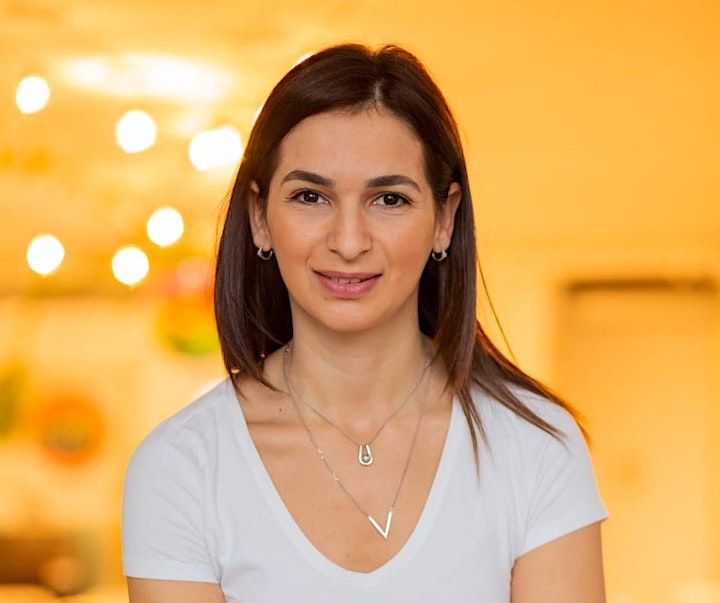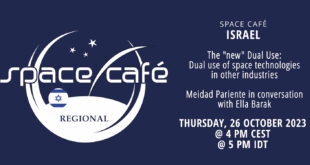By Meidad Pariente

In the second episode of season 2 of Space Café Israel, Meidad Pariente is in conversation with Ella Barak, the Director of the ASTRA accelerator at Starburst Aerospace.
Could you reveal a personal aspect that hasn’t been included in your LinkedIn profile, giving us a peek into a lesser-known facet of your life?
I’m a proud mother of three young boys, and they are my primary motivation behind many of my personal and professional decisions. They are my guiding stars in many daily decisions and during my career path. And it’s really important for me, while I make my choices, to think of what will make them proud, and that’s not something you can see on my LinkedIn page. Many times, it’s also a reminder for me of how I want to build my life, how I want to build their lives, and what meaningful things are. These are things that I didn’t think of before becoming a mother.
While you unmistakably champion innovation, your extensive background encompasses roles in more conservative institutions like the IDF and Deloitte. Did you face challenges advocating for innovation within these organizations?
Well, first of all, I don’t think we have enough time to talk about all these challenges and advocate for innovation in more conservative institutions like the IDF. While I was a consultant, I mainly worked for public sector organizations, government offices, government-owned companies, etc. These organizations presented their challenges. Whenever an organization is not a digital native, it’s necessarily an immigrant to the digital and innovative world. When an organization is an immigrant, we have language barriers, language gaps, and cultural differences, like what we know from human aspects of immigration and different cultural aspects that are not easy to gap. These are exactly the things that drive and motivate me to bring impact and real change. It is not a matter of saying, but you can see a big difference once innovation and technology are implemented in such organizations. Sometimes, some organizations, even if they’re not digital native there, can be very innovative. However, the cultural aspects of manufacturing or developing everything in-house, not outsourcing or bringing and implementing new technologies from outside, are the opposite of open innovation. It characterized a lot of traditional organizations. Even in the intelligence corpse, which, objectively speaking, is one of the most innovative organizations in Israel and with the brightest minds. So many times, I came across people and leaders. Brilliant leaders who said, we don’t need that (innovation – m.p) right now. We have our breakthroughs. But the whole idea of open innovation is to bring breakthroughs from outside, even though they might not be as good and as bright as what you have developed inside your organization and within your team. So definitely, yes, it’s something that we come across. I think it’s one of the biggest challenges of innovation leaders. You have to earn trust in promoting your ideas. And innovation can be quite annoying to many people within an organization. People have their work plans, objectives, and daily tasks, and then you come up with something that is on top of everything they must do. So you need to create trustworthy partnerships with people who trust you and understand that you want to promote their agenda that aligns with their agenda and does not contradict the agenda they want to promote.
Let’s talk about generic AI. The ability to chat with someone who is not human, suddenly, you can have someone talking to you while you’re on your journey to space and minimize the sense of loneliness. Maybe now astronauts won’t have to learn all of the manuals on handling malfunctions while in space. Maybe now, they can just chat with a bot. We tend to consider generative AI relevant for advertising, media, etc. But with some simple adjustments, it can be so relevant to space.
Could you provide some insights into the Astra accelerator? What does it entail, and what attracts startups from around the globe to apply for an accelerator based in Tel Aviv?
Sure. Well, first of all, Starburst Aerospace is a global powerhouse. It has eight branches worldwide, including Paris, Los Angeles, Singapore, and Tel Aviv. Each one of those branches is dedicated to advancing Aerospace and Defense Innovation through specialized acceleration programs. Now within this portfolio, ASTRA is a dynamic acceleration program, and it’s built a partnership with the prestigious Israeli Aerospace Industries. Now, this collaboration is more than just a partnership. It unlocks doors that may have seemed out of reach for startups in the past and in general. We know that one of the hardest things for startups is to put a foot in the door of corporates, let alone corporates from the aerospace industry. Now, transforming the space market from a distant dream into an accessible reality is a game changer. In addition, Starburst’s global presence, on the one hand, and eyes on industry leadership together created an ecosystem where innovation can flourish, and transformative ideas can find the support they need to thrive. That’s meaningful in any entrepreneurship, generic journey, and for every startup, but especially in the space industry, where you have so many unmet needs, barriers and thresholds that are difficult to unlock. In addition, you’ve mentioned people coming from around the world to participate in this program. Israel has rightfully earned its reputation as a startup nation. Now, we have Tel Aviv, which stands out as a city that empowers every entrepreneur to believe in their dreams. It’s like the American dream but the entrepreneurship dream in Israel. So startups in the ASTRA accelerator can gain access to industry experts, mentors, and investors. They make a big difference, a real game changer for early-stage startups and entrepreneurs.
Typically, when the term “dual-use” is mentioned, it refers to applications in both civilian and military contexts. However, in your context, it carries a distinct meaning. Could you elaborate on what you refer to as the “new dual use”? What traditional industries can benefit from downstream space applications?
Sure, well, as you explained, traditionally, the term “dual use” has been associated with civilian and military applications. And when we talk about space, unlike the historical notion that space Applications were primarily reserved for government authorities and agencies, space has transcended its conventional boundaries and become relevant to almost every industry. And now that’s a huge difference. Speaking of those childhood dreams, it seems so distant that only an astronaut, one out of millions only, just one out of millions of scientists, will get to work on space projects. And now, we understand that developments made for space are also relevant to our lives here on Earth. And also vice versa. Many things we develop here on Earth are relevant to launches and texted in space. And suddenly, you get this fantastic synergy between all of those aspects. And in almost every product and development, you can think of unique applications for space. And, like I said, vice versa. From insurance to automotive, health, and climate, you also mentioned at the beginning of our program that it’s challenging to think of applications and technologies not influenced by space or applied to Earth. Let’s take something we might not have considered relevant to space. Let’s talk about generic AI. The ability to chat with someone who is not human, you have that in speech, you have that in video, and you have that in photos.
Now, suddenly, you can have someone talking to you while you’re on your journey to space and minimize the sense of loneliness. You could have a doctor examine you while you’re in space. Now astronauts won’t have to learn all of the manuals on handling malfunctions while in space. Now, they can just chat with a bot (that will guide them – m.p). We consider generative AI relevant for advertising, media, etc. But with some simple adjustments, it can be so relevant to space. And you asked about downstream applications. So we have so many applications that are even relevant to products that are so simple. And we’ve known them ever since in our daily lives, like the weather report, the daily weather report, using satellite technologies, it can even be accessible to our mobile phones. So communications, data imaging, so many of these things change by the fact that because they are based on Space Technology, and many of the times we, the public, the clients that use those interfaces that use those products, we don’t even have to care that it’s based on space technology. If I’m a farmer, and I want to know, what is this just a situation of my crops in the fields that I nurtured, so I don’t have to use only I don’t have to go out to the field every time? I could use static images and plan my irrigation system based on satellite technology. It doesn’t make me a space expert. However, the understanding that I can base my developments on Space Technologies is impressive. And the fact that it’s accessible to many applications today is a real game changer.
Lastly, looking ahead to the future, what are your anticipations for the Israeli space industry in the year 2050?
Well, first of all, I can’t even imagine a year ahead without praying and waiting to see all the people who were kidnapped on October 7th return home. And that’s my biggest hope. After that, I’m optimistic that my vision is rooted in the belief that Israel will continue to be at the forefront of the space industry. Much like what we did in the cybersecurity industry, I believe the term “startup nation” is not just a title. It’s a mindset. It’s the Israelis that propel innovation and excellence. As we move to 2050, I foresee Israel’s space industry playing a pivotal role in pushing the boundaries of exploration and technological breakthroughs. The spirit of innovation that defines us will continue to drive groundbreaking advancements. I would add that I would be thrilled to see more Israeli women in this industry. I do not doubt that we will have a crucial role in technological breakthroughs, even though compared to our colleague nations in this arena, we are much smaller, much younger, and even have fewer resources. We have such an important role in ensuring this future will be much better for all of us. And as a part of it, we must ensure that space exploration will be one of our biggest efforts.
Ella Barak is currently serving as the Director of the ASTRA accelerator, a ground-breaking initiative in partnership with the IAI to advance innovation in space technology. With a rich background as a former Open Innovation Consultant for the Intelligence Corps in the IDF and her experience at Deloitte as a Senior Consultant, Ella brings a wealth of expertise to the table. Her career is marked by a dedication to fostering innovation and facilitating strategic partnerships that have significantly impacted the technology industry.
Ella’s passion for open innovation is evident in her extensive work with start-ups and established organizations, creating collaborative environments that drive forward-thinking solutions. Beyond her professional journey, Ella is a staunch advocate for gender equality and diversity within the tech sector. Her commitment is further exemplified by her comprehensive research on the intersection of artificial intelligence and gender equality at TAU.





